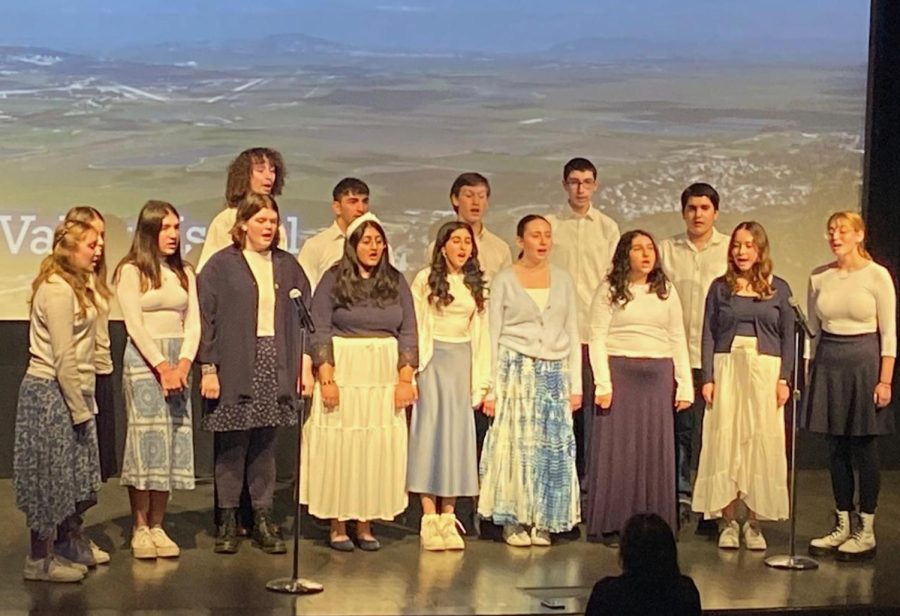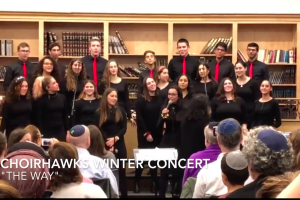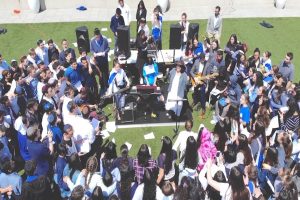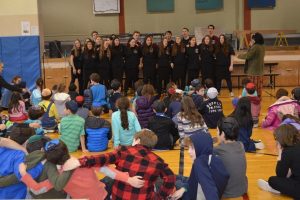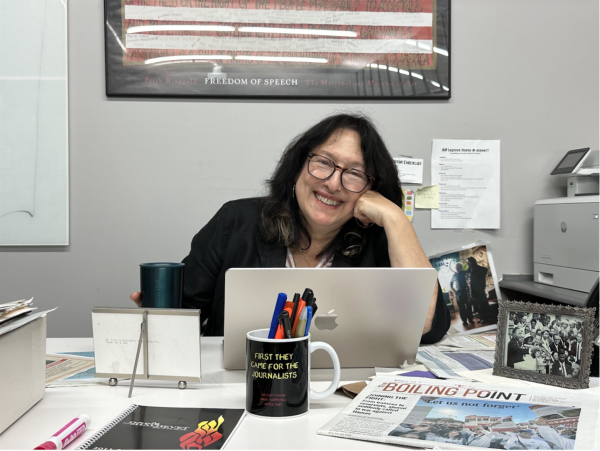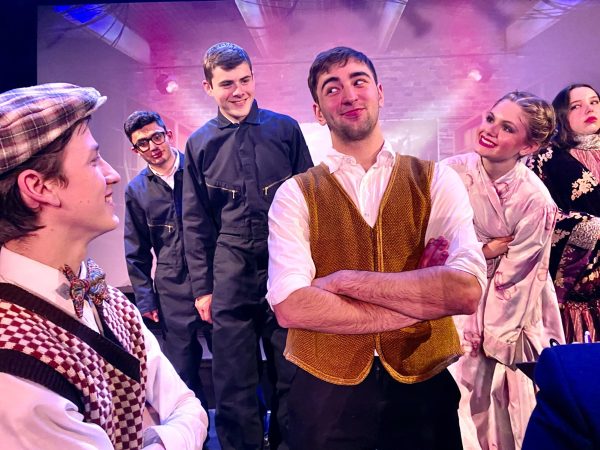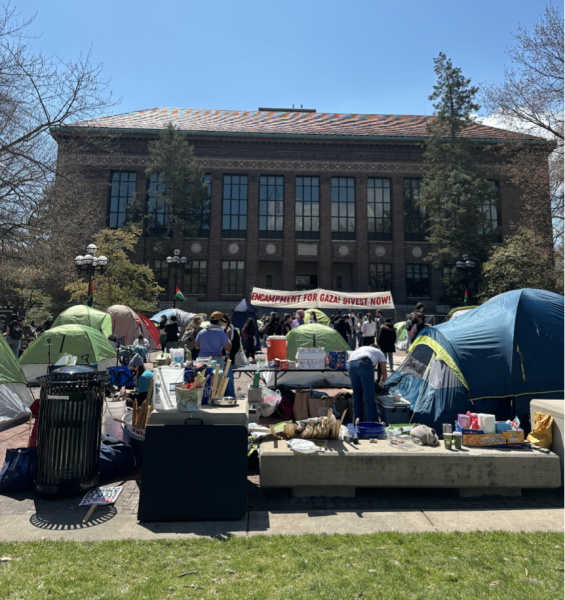Choirhawks share a song of history to mark 75th anniversary of UN partition vote
In first out-of-school performance since Covid, Choirhawks sing for diplomats and Judea Pearl at Museum of Tolerance
SONG: With a photo of Israel’s Jezreel Valley behind them, the Choirhawks sang “Shir Ha’Emek,” a pioneer song about that valley, at the Museum of Tolerance.
In a dimly lit auditorium scattered with people, the Shalhevet Choirhawks used music to paint a picture of Israel in the months just before it was formally established.
The performance – their first for a non-school audience since Covid shut down the choir in 2020 – was part of a program at the Museum of Tolerance that celebrated the 75th anniversary of United Nations Resolution 181, which took place on Nov. 29, 1947. The resolution partitioned what was then Palestine into Arab and Jewish states, and led to the declaration of the State of Israel seven months later, May 18, 1948.
On Monday morning, Nov. 28, the Choirhawks took the audience back in time, displaying the simplicity of the land of Israel and the settlers who nurtured it with the pioneer song “Shir Ha-Emek,” Song of the Valley, written in 1934.
The song was chosen by one of the event’s main organizers, Professor Judea Pearl of the Daniel Pearl Foundation, who had asked the Choirhawks for ideas.
Shir Ha-Emek, Professor Pearl said, illustrated the impact of Jews who arrived in Israel before the partition, and built farms, roads and cities.
“Israel was not established by the UN – it was already there,” Professor Pearl said in a speech near the end of the Nov. 28 event.
He said the population of the area was a mere 60,000 in 1917, but had grown to 600,000 by 1947.
The song’s lyrics, all in Hebrew, are about the beauty of the land and the feelings of the pioneers. For example, one verse begins, Yam hadagan mitnoe’a, shir ha’eder metzal’tzel:
The sea of grain is swaying, the song of the flocks rings out.
This is my land and her fields, this is the Jezreel Valley.
Bless and praise my country, from Beit Alpha to Nahalal.
“It would not be an exaggeration to state that the tractors of Beit Alfa and Nahalal had as much role in ushering the state of Israel as the diplomats in Lake Success,” Professor Pearl said. “Ushering the elaborate infrastructure laid by the yishuv before 1947 won the admiration of all the UN delegates to the area and compelled them to recommend partition.”
“When they drained the swamps of Emek Yizre’el,” – the Jezreel Valley, mentioned many times in the song – “ and Shir Ha-Emek that we heard from the choir,” he said. “Shir Ha-Emek sung today is our trust deed.”
Also helping mark the occasion were diplomats from countries which had supported the partition resolution. Organizers said the Los Angeles consuls general of all 33 countries that voted for Israel in 1947 had been invited to the event, and 13 were present, including representatives of Bulgaria, France, Romania and the Philippines.
The majority of the Choirhawks were at the event, and were also the only Shalhevet representatives there. Other local high school students were also in attendance, including a class from YULA Boys high school.
Dr. Hillel Newman, Consul General of Israel to the Pacific Southwest, said Israel’s establishment concluded centuries of attacks from outside forces.
“We could have sunk into a narrative of victimhood,” Consul-General Newman said. “…We did not. We chose to build a future state in the spirit of positivity and harmony. We chose to build a country that would bring benefits to humanity and society. We chose light over darkness.”
Choir members, too, said they found Shir Ha-Emek meaningful specifically, as they got to display a different aspect of 1947 Israel to the attendees: not the political side but the agricultural side.
“Shir Ha-Emek was mostly about the land,” said junior Rachel Blumofe, the co-president of the Choirhawks. “If you really translate it, it’s about the souls that died in that land, and the people that it impacted. It really had a deeper meaning behind it, [and] I think it really touched the people in the audience.”
In the final moments of his speech, Prof. Pearl addressed the ongoing conflict between Israel and Palestine.
“Finally, to those who claim today that the UN and the world powers had no right to draw borders against the wishes of the Arabs, I would say relax.” Prof. Pearl said.
“Israel was not established by the UN. It was already there when they drained the swamps of emek Yizre’el.”
Choir director Ms. Joelle Keene said when Prof. Pearl invited the Choirhawks to perform, he asked whether the group could sing the American and Israeli national anthems, but also whether they knew any songs of Israel pioneers.
Dr. Pearl was born in then-Palestine in 1937. He currently is Chancellor’s Professor of Computer Science at UCLA and Director of the UCLA Cognitive System Laboratory.
“He and I talked for a long time about what song we were going to sing,” said Ms. Keene.“As soon as I mentioned Shir Ha-Emek as a possibility, he just started singing it. He knows that song really well.”
She said he felt it would be perfect because it honored the people no one talks about: the people who settled the land before it was a state. Shir Ha-Emek was mostly about the land. If you really translate it, it’s about the souls that died in that land, and the people that it impacted.
“It was very moving to me that a song we’ve sung before and that I personally really love was so deeply meaningful to him,” Ms. Keene said.
Prof. Pearl is also the father of Daniel Pearl z”l, a Wall Street Journal foreign correspondent who was kidnapped and murdered by terrorists in Pakistan while on assignment covering Al Qaeda after 9/11. We did not. We chose to build a future state in the spirit of positivity and harmony. We chose to build a country that would bring benefits to humanity and society. We chose light over darkness.
His parents, Judea and Ruth Pearl z”l, started a foundation in their son’s name, and since he loved music as well as journalism, it also sponsors annual concerts in his honor around the world, called Daniel Pearl Music Days.
“Daniel Pearl was not only a journalist, but a violinist,” said Ms. Keene. “And when he died his parents set up the Daniel Pearl Foundation, partly about journalism and partly about music.”
The Choirkawks performed at one of the Music Days concerts several years ago, and Prof. Pearl told Ms. Keene it was the first Music Days performance he’d heard in Hebrew. This year, he remembered the choir, and reached out to Ms. Keene to ask if they could sing at the Israel event.
Leah Cohen, a 10-grade Choirhawk, had never heard the Pearls’ story before the choir was invited to perform, and didn’t know how meaningful the song would be to Professor Pearl.
“We got to hear everything about Judea Pearl’s story,” said Leah. “I had no clue who he was, and when we met him originally before the event, he saw us and got teary-eyed when he heard us practicing and was singing along with us.”
It was also meaningful for many of the newer members of the choir, for whom it was the first time they had performed outside of school. Choir was mostly dormant during the Covid pandemic, because singing was considered too dangerous.
“So this was my personal first time performing outside of school with choir,” said Leah. “It definitely felt like there were a lot more eyes on us than just the eyes that we’re used to, so it was a little terrifying.”
Most of the Choirhawks who performed said it was nerve-wracking to perform with a different audience then they are used to.
“It was definitely a lot more stressful, in a way,” said Rachel. “We didn’t have the support of our community there…but it was also nice to know that we were performing in front of other people, not just in a high school environment.”
In addition, Shir Ha-Emek turned out to not be the easiest song to learn – especially since the group only had less than a month between when Prof. Pearl asked them to sing it and when the performance was held.
Because of that, the group tried many versions to perform it, including some that did not have all the parts participating. But the final result was the whole choir featured and performing on stage.
“It was so difficult, because none of us knew the words,” said Leah. “None of us knew the melody, none of us had heard the song before, so it was completely new to us, [and] we had about two weeks to learn it.
“I loved it,” said Leah. “The fact that there were so many representatives…was very intimidating…but so, so cool…it was great.”
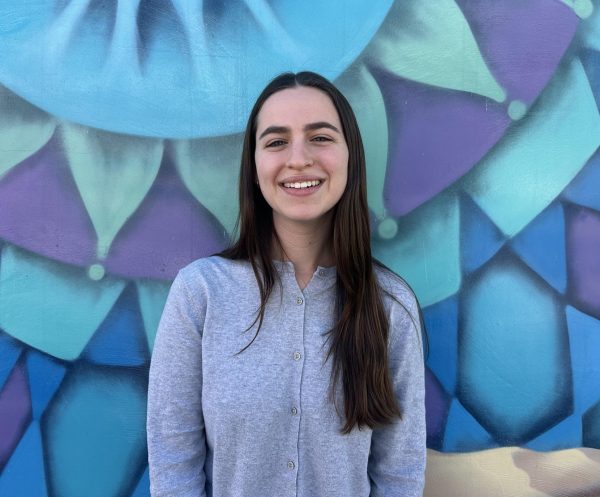
Sophie Bick Katz, 12th grade, joined the Boiling Point as a staff writer her freshman year. She served as Outside News Editor her sophomore year, including Chief Editor of the second print edition, and is continuing as the Editor-in-Chief for her second year. She was only the fourth junior in Boiling Point history to hold the top post. Sophie enjoys writing in-depth feature pieces and localizing national and international news. She has won awards from organizations including the Columbia Scholastic Press Association, the National Scholastic Press Association, Quill and Scroll, the American Jewish Press Association and the New York Times Learning Network. Outside of the paper, Sophie is a representative on Shalhevet’s Agenda Committee, a proud contributor to Nitzotzei Torah, leads Teen Minyan at her shul and plays guitar. In her free time, she likes listening to music and hanging out with friends.

